*Note from A Chronic Voice: Lisa is writing a series of guest posts on the blog on effective methods to cope with chronic illness, principles which she has applied to her own life with success. In this article, she shares how her initial skepticism (and even derision!) about using a gratitude journal turned into an appreciation, when she saw the positive changes it made in her life. If you have trouble forming new habits, there are some nifty tips here as well. I hope you that you will find the tools in this article useful, and that they will be something you can add to your own chronic illness management toolkit.
*This post contains affiliate links. It will not cost you anything to click on them, but I will get a small referral fee from any purchase, which will be used to maintain this blog. Thank you!
Table of Contents
Chronic Illness Changes Everything in Your Life
Becoming sick with a chronic illness changes your life in just about every way – your relationships, your job, your day-to-day choices, so on and so forth. At times it can be hard not to let that dominate your thinking. I’ve got great news for you though – it’s actually within your power to do something about this.
I have always been an optimistic and positive person. Yet when I became sick, these negative thoughts drained and distracted me, when opportunities for gratitude and joy were still very much alive in my life. I decided that I had to find new strategies to redirect my focus, aware that what used to be innate to me was now going to take a bit more practice.
A Useful Tool I Learned from a Book
This is again where the book, “The Happiness Advantage: The Seven Principles of Positive Psychology That Fuel Success and Performance at Work”, came into play for me. I know what you’re thinking: why would I read a career-focused book? How could it possibly help with getting out of bed or off the couch? What does it do for sorting through the mail, throwing a load of laundry in, or letting the dog out? But therein lies the beauty of the book. While its title is indicative of success and performance at work, every single principle is applicable to life with chronic illness.
The First Useful Strategy I Applied to My Own Life
To give you an example, here’s the first strategy that helped me to refocus my mind, away from all the thoughts that troubled me in relation to my illness. I will admit, this strategy seemed a little cliché in the beginning, but I soon chided myself for having had such thoughts, because this idea really works!
I needed a little convincing to begin with, so I started with the science. In general, we need three positive experiences to address a negative one. On particularly hard days, we need to double this and aim for six. (While the ratios up for debate, the general consensus is that we need more positive than negative experiences for this to work.) To do this, you need to train your brain to seek out the positives in your life, which can be especially trying during difficult times. It takes sorting through a whole lot of weeds to find the blooming flowers, lights of opportunity, and the path to happier thoughts.
The Simplicity and Benefits of a Gratitude Journal
I have found a gratitude journal to be very helpful in my personal journey. When I first read about this in the book, I imagined that I would be too tired to journal, and wondered how that was really going to help. (Yikes, so much negative thinking, and I hadn’t even gotten started yet!)
But it really only takes about five minutes or so to get it done (if even!). This is still doable even for those with busy lives, limited attention spans, or low energy levels (I know this feeling well myself). And when I say ‘journal’, I don’t mean essays! It can be little things, such as:
- Sorted through my laundry.
- Father brought me my groceries for the week!
- Enjoyed a short call with a friend.
- Relaxed through a session of gentle yoga.
How to Get Started with Your Gratitude Journal
There are a few critical keys in order for this to work. While studies go back and forth about how many days it actually takes to form or break a habit, let’s start with 21, which most people are familiar with. Before you begin, make a firm commitment to doing this for at least 21 days straight. And as the saying goes, ‘out of sight, out of mind’. So put your journal in a prominent and accessible place that’s within your main circle of reach.
You also need to be aware that finding six things to be grateful about is going to be tough on a bad day. This is the best time to get your creative juices flowing. Don’t ponder or feel like you need to achieve something big; simply list down whatever pops into your head.
Remember that every little bit counts. Doing your laundry may be a huge accomplishment, but may not be doable on certain days. So break that down – sort your laundry today, then wash and dry a load the next. Each of these actions can count as an entry, and make up part of your success story for the day.
Finally, pick a specific time of day to journal. Do you want to start your day with a boost by jotting down yesterday’s successes? Or do you want to end it on a positive note, by recounting your achievements for the day?
What This Daily Activity Does to Your Brain
You may be thinking at this point, ‘yes I’ve heard of gratitude journals before and I can write these things down. But what really is the goal here? Why are you asking me to do this? It sounds so elementary.’
But this ‘simple’ activity actually trains your brain to seek out the positive aspects of your life. Instead of focussing on your pain, it learns to seek out things to be grateful about through your firm commitment. It stretches your mind over time by forming new neural connections; this is also known as ‘neuroplasticity’. The more you do it the easier it gets, and the faster you will be able to spot the good in your days. Your everyday thoughts begin to transform into beautiful ones instead. And who knows, your journal may even become a mind map or recording of how your brain has learned to transform its thinking over time.
A Great Tool for Reframing Your Life Story
To reiterate, I did find a gratitude journal a little much in the beginning, but it does work. I’ve also found it to be especially helpful on the hard days. Flipping through the pages of the past month helps me to reframe the story of my life in a more positive light. For some reason it can be easy to forget our successes, while our downfalls stay rather memorable. A gratitude journal can turn that around for you too, when used both as a daily tracker, and as a tool to gain an overview of your life.
This, my friends, is an easy way to train your brain to work for and not against you. As mentioned earlier, the more you practice the easier it gets. Your brain will start to seek out and even create these positive moments, knowing that you will be documenting it. And with that, you have begun the process of retraining your brain to focus on gratitude and successes you have brought about for your own day, and even for others! I would encourage you to give it a try; I think the results will surprise you in a good way!
*Note: This post is meant for educational purposes, and is not to be substituted for medical advice. Please consult your own doctor before changing or adding new treatment protocols.
Read the First Post in the Series: Find Your Way Back to Happiness with a Chronic Illness
-
For More Insight:
- The Science Behind Adopting New Habits (And Making Them Stick) (forbes.com): http://bit.ly/2yamyGk
- How To Start New Habits That Actually Stick (jamesclear.com): http://bit.ly/2C6wzab
- Gratitude Journal: 67 Templates, Ideas, and Apps for Your Diary (positivepsychologyprogram.com): http://bit.ly/2pNJd6t
- The Magic Relationship Ratio, According to Science (gottman.com): http://bit.ly/2CF2Xld
- The Ideal Praise-to-Criticism Ratio (hbr.org): http://bit.ly/2yeaP9Q
If you liked this article, sign up for our mailing list here so you don’t miss out on our latest posts! You will also receive an e-book full of uplifting messages, quotes and illustrations, as a token of appreciation!
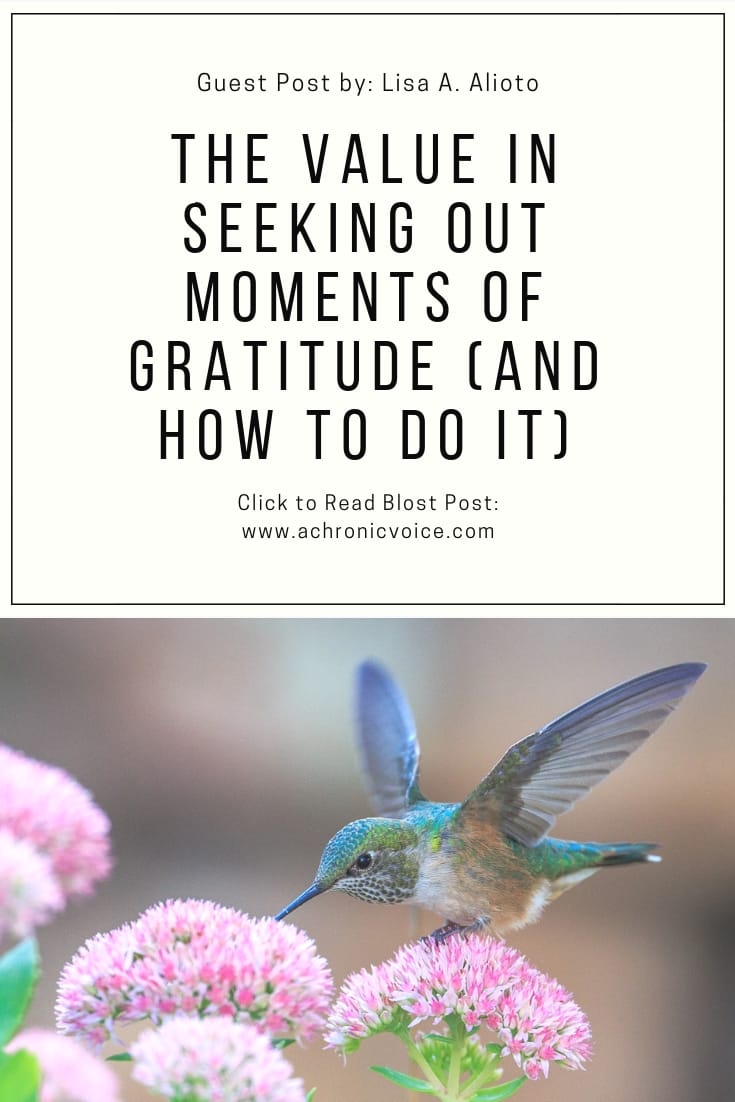
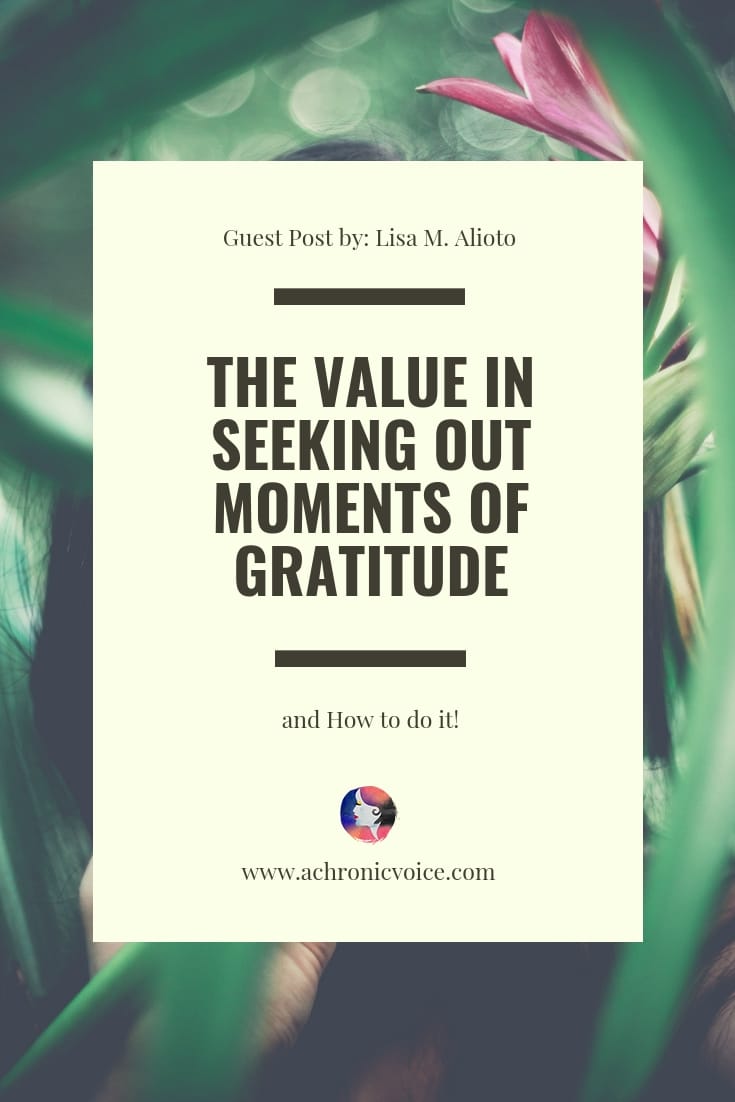
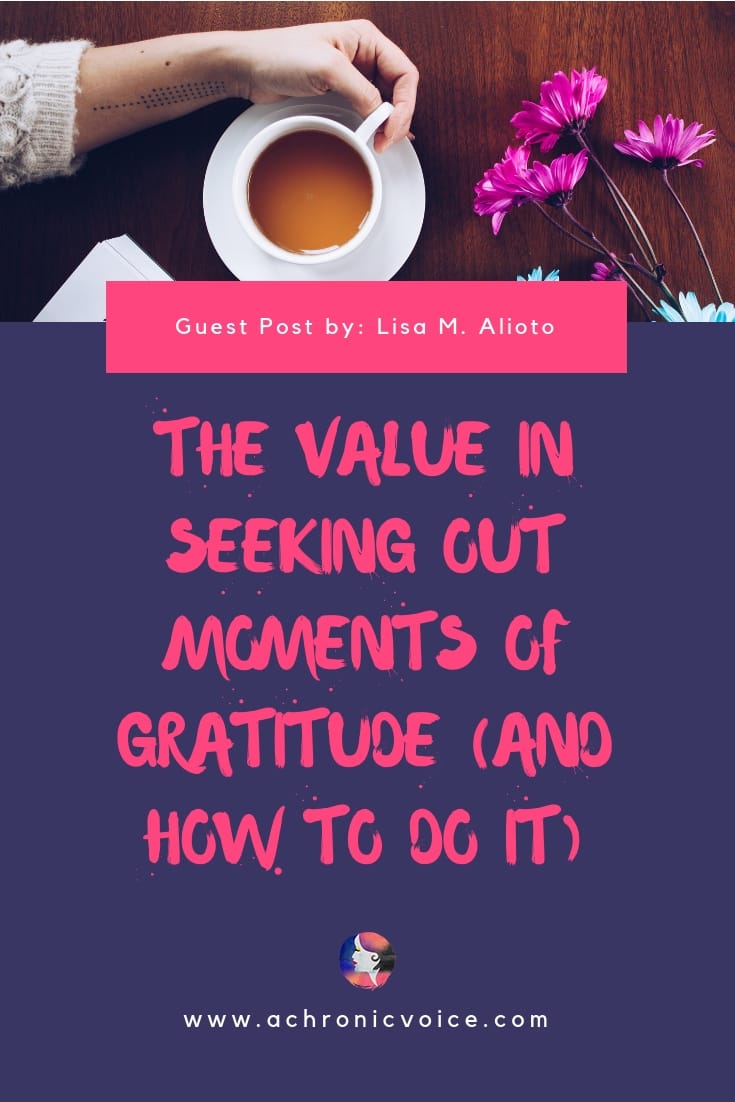
Contributor Bio
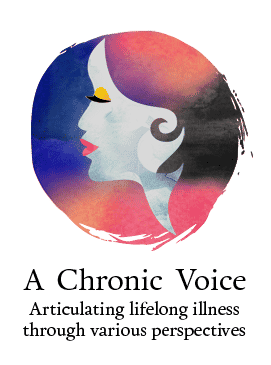
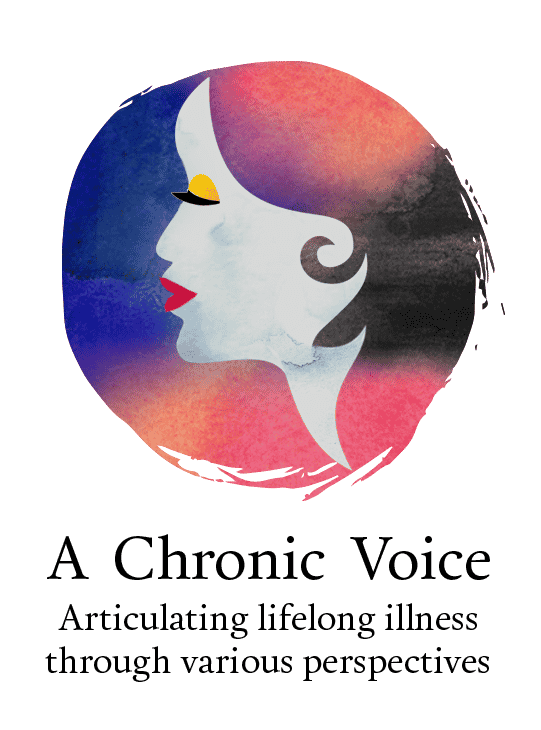
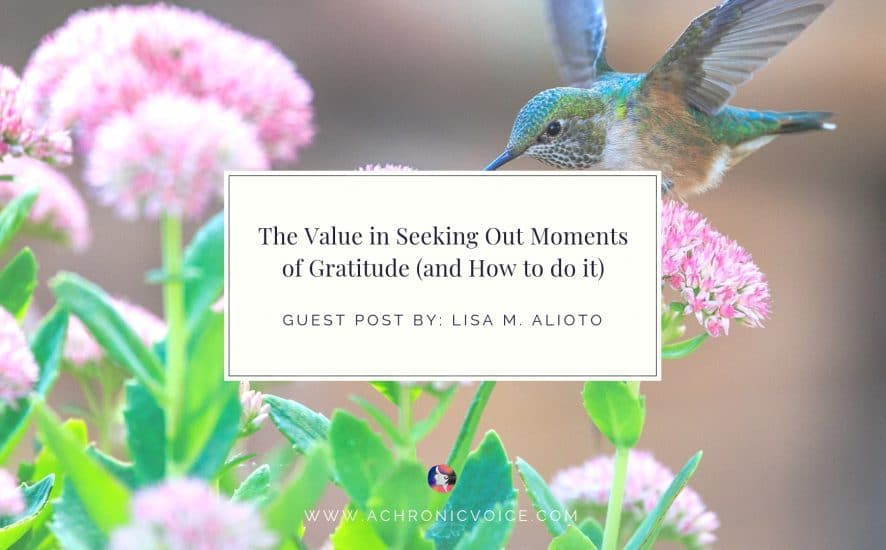

(Almost) every day before I go to sleep I think about something I’m grateful for and that I’m proud of myself for that day. But writing it down seems like a good idea. Especially on a bad day to look back on.
That’s the perfect and beautiful way to end the day! 🙂 Sounds like you have a practice going on already, with or without a journal! I suppose with a journal the benefit is the ability to look back especially on the bad days, as it’s so easy (at least for me) to forget something even after one night.
Most of the time I am able to be positive and grateful. Thanking the universe for all that keeps me better off than some. But occasionally when I least expect it … the condition bites hard. My looks do not pity me and though self pity is never goo,d just sometimes … we all need someone to smile and say ‘I Know. ‘
I wouldn’t keep a journal it just is not my thing, I once read ‘the secret’ It gave me a way of thinking, a way of being , that you live your life in the way of grattitude. Eleven years on and I still refresh myself and would not be without it. A bit like your journal it pulls me back into the correct mindset. But we all have to find a way forward, we are human after all. A super post thank you.
Thanks for sharing your thoughts, Ellen! Actually like you, I don’t keep a gratitude journal either. I tried for some time, and it didn’t do anything for me. I am unsure, but it may be that I am grateful in that very moment in itself already (and on days when I’m deeply depressed nothing works, heh).
But I think what Lisa shares in this post is excellent, and works for many others out there! We all have different methods to cope and live our best lives, and I think every ‘tool’ is worth sharpening in the arsenal. Never know when you’ll need it 😉 Sending love!
Thanks for this. After a particularly bad week last week, with a flare up in my physical health conditions which inevitably had a knock on effect to my mental health, I realised I still have a lot to do in reframing my thoughts and working on my emotional and mental health for the longterm.
Hi Rachel, it’s never easy when dealing with pain, no matter how many times we’ve been through it, and how much ‘common sense’ things we know to do! Hang in there and I hope you feel that little bit better soon. Sending lots of good thoughts and hugs xx